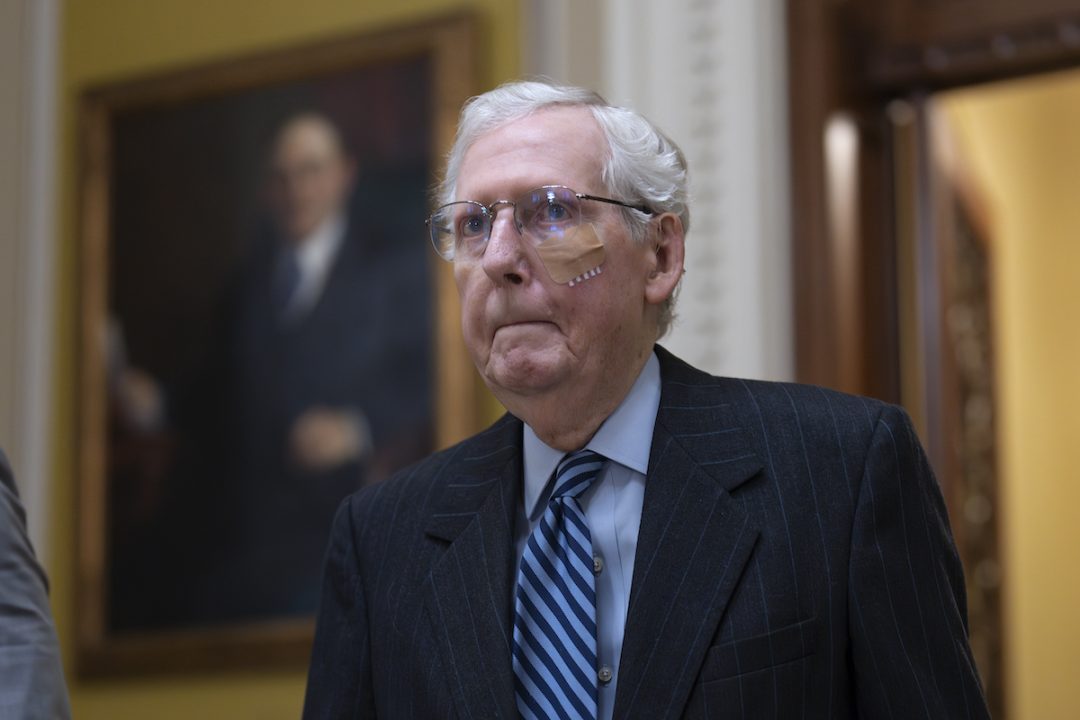
On Tuesday, news broke that the Defense Department is putting together plans to pull U.S. troops out of Syria. This is the sort of thing that drives empire builders mad. In late 2019, President Donald Trump ordered Defense Secretary James Mattis to withdraw American troops from Syria. Mr. Mad Dog thought the idea so repulsive he resigned in protest.
If the Pentagon is to be believed, there are about 2,000 troops in the worn-torn, recently upset nation. The official justification for America’s presence is to “degrade the Islamic State terrorist group and support local partners operating there.” U.S. troops have been languishing in the Syrian desert since at least 2015. That’s when Barack Obama sent them there to counter said Islamic State. For those who haven’t been keeping up with Syrian current events, the nation hosted a coup just in time for Christmas 2024. An Islamist militant organization called Hayat Tahrir al-Sham (HTS) ousted longtime dictator Bashar al-Assad and is now running things, a development that supposedly caught the entire international community by surprise, including the United States, which, again, has been in the country for a decade.
The American Empire
America is an empire. It maintains about 750 U.S. military bases abroad, according to the Quincy Institute for Responsible Statecraft. Moreover, the U.S. has at least three times as many overseas bases as all other countries combined. Those bases cost taxpayers an estimated $55 billion annually. Good thing we’re not $36 trillion in debt.
The average American doesn’t know his country is an empire, but he intuitively opposes it. A YouGov poll from December 2023 revealed that only 12 percent of Americans preferred “extensive” involvement in foreign affairs, which is the current degree of involvement. More than double that, 24 percent, took an “isolationist” position. The largest segment, YouGov says, prefers a Goldilocks degree of involvement, “somewhere in between.” More Americans would likely be in the “isolationist” category if they knew what it really meant. Nevertheless, however these numbers are interpreted, it’s clear that, overwhelmingly, Americans do not harbor interventionist ambitions.
But that doesn’t matter to the people in charge, including elected legislators like Kentucky’s Republican Senator Mitch McConnell.
A major theme in the January/February 2025 edition of Foreign Affairs, the affiliate magazine of the globalist think tank Council on Foreign Relations (CFR), is the bemoaning of the potential for the newly elected leadership to reduce America’s international military presence and overall intervention. The CFR has for a century stuffed their policy advisors into presidential cabinets for the primary reason of perpetuating American interventionist policies (former secretary of state Antony Blinken among them). One of the contributors to the latest edition of Foreign Affairs is none other than McConnell. His essay is titled, “The Price of American Retreat: Why Washington Must Reject Isolationism and Embrace Primacy.”
U.S. Meddling Creates Peace?
McConnell starts describing a world in disarray that will only worsen if the American people get what they voted for:
China has intensified its efforts to expand its military, political, and economic influence worldwide. Russia is fighting a brutal and unjustified war in Ukraine. Iran remains undeterred in its campaign to destroy Israel, dominate the Middle East, and develop a nuclear weapons capability. And these three U.S. adversaries, along with North Korea, are now working together more closely than ever to undermine the U.S.-led order that has underpinned Western peace and prosperity for nearly a century.
Did you catch that? The U.S.-led rules-based order that came about after World War II has brought about peace and prosperity for almost 100 years! Never mind the 60 million who died at the hands of the Soviets (this is a conservative estimate), the 3 million killed during Mao Zedong’s Cultural Revolution, the millions of others who perished in various other peaceful and prosperous areas of the world — or the fact that, as McConnell just pointed out, war has been raging for years in Eastern Europe and in the Middle East, both regions that hosted a heavy military presence for many years before those wars erupted. In McConnell’s fantasy world, U.S. intervention in Korea, Vietnam, Iraq, Afghanistan, and a slew of other diplomatic black holes is all part of keeping the peace and prosperity.
The senator then gets to his point. He worries that instead of addressing the Russia, China, and Iran threats through interventionist policies, “today’s revanchist powers do not seek deeper integration with the existing international order; they reject its very basis.” America, he adds, cannot “afford to shrug off faraway chaos as irrelevant.”
Missed Opportunities
The longtime Swamp resident sees China as America’s primary threat. He thinks Obama didn’t make “sufficient investment in U.S. military power” in Asia. He also decries Obama’s “premature withdrawal from Iraq” and hopes Trump rejects “the myopic advice that he prioritize that challenge by abandoning Ukraine.” The U.S. is annoyingly good at missing opportunities to go to war with Russia, McConnell whines:
The George W. Bush administration’s failure to respond forcefully to Putin’s invasion of Georgia in 2008 was a missed opportunity to nip Russian aggression in the bud.
But despite his age, McConnell is a persistent fella. When Putin invaded Ukraine, he saw another opportunity to get America’s men and women bombed and shot at:
As it became clear that Putin would launch a full-scale invasion of Ukraine, I urged Biden to offer meaningful lethal aid to Ukraine and expand the U.S. military footprint in Europe. But the president demurred.
But he does admit that some good has come out of America refusing to play Europe’s policeman:
U.S. allies on the continent now spend 18 percent more than they did a year ago on defense, a far greater increase than the United States’. More than two-thirds of NATO members now meet or exceed the alliance’s target of spending at least two percent of GDP on defense.
McConnell, of course, thinks the U.S. should increase defense spending. He still harbors the lingering hope that some how, some way — any way! — we can get back to warring, and at that, warring in multiple parts of the globe:
… It is reckless for U.S. politicians to visit Taipei or talk tough about China if they are unwilling to invest in the capabilities necessary to back up U.S. commitments. The United States needs a military that can handle multiple increasingly coordinated threats at once. … The United States must get back to budgets that are informed by strategy and a force-planning construct that imagines fighting more than one war at once.
His view that America should have a strong military is not wrong, but his motivation is. Nobody wants to mess with a strong America. But when spread thinly throughout the world, America is weak and vulnerable.
We can only hope McConnell’s fear becomes a reality. Noninterventionism was indeed a major promise of Trump’s reelection campaign. Not one single president has ever run on the promise that a vote for him is a vote for war. The reason is simple: Normal people don’t want war. That’s why the warmongers have always worked hard to launder their true desire for perpetual war. They present the narrative that preemptive warring prevents defensive warring. So, in essence, the globalists’ argument is that the best way to prevent a defensive war is to engage in perpetual wars around the world.
The rest of McConnell’s essay is dedicated to making the case for increased defense spending. Then he concludes with the oldest trick in the book. If America retreats to an isolationist position, he warns, as it did before World War II, it won’t be ready to take on the next Hitler.
The Uniparty
McConnell is part of the Uniparty, the long-standing, entrenched machine that includes both major political parties. His cumulative freedom score in The New American’s Freedom Index is 56 percent; that’s how often his votes have aligned with the U.S. Constitution. He’s part of a big group of Republicans who mislead constituents with talk of conservative values and policies while playing ball for the Uniparty. Others like McConnell include Alaskan Senator Lisa Murkowski, who has obeyed the Constitution only 45 percent of the time she has voted; Utah’s Mitt Romney, who managed to vote along constitutional lines only 44 percent of the time during his disappointing stint in Congress; Susan Collins of Maine, who has outdone McConnell and Romney with her impressively bad freedom score of 38 percent; and many others. D.C. is crawling with Mitches and Mitts.
Two Parties “Almost Identical”
Carroll Quigley, a former history professor at Georgetown University, documents in his tome Tragedy & Hope the ambitions of an international cohort of financial power-players to “create a world system of financial control in private hands able to dominate the political system of each country and the economy of the world as a whole.” He knew the details because he was allowed for two years to look over the secretive documents that belong to these people. His only objection, he said, was not that such diabolic agendas exist, but that they were kept secret. In the book, Quigley explains how the faux two-party system is used to serve the means of the globalist conspiracy:
The argument that the two parties should represent opposed ideals and policies … is a foolish idea. … Instead, the two parties should be almost identical, so that the American people can “throw the rascals out” at any election without leading to any profound or extensive shifts in policy. … Then it should be possible to replace [the party in power], every four years if necessary, by the other party, which will be none of these things but will still pursue, with new vigor, approximately the same basic policies.
Fortunately, the interventionists’ stranglehold on at least one major party has been loosened, and one of those “basic policies,” empire building via the nation’s foreign policy, is endangered. The MAGA movement is a result of decades of attempts by informed patriots to elect to power some semblance of a representative political party. Trump’s executive orders pulling the U.S. out of the World Health Organization and the Paris climate accords, and his promise to consider exiting the UN Human Rights Council (UNHRC); the UN Educational, Scientific and Cultural Organization (UNESCO); and the UN Relief and Works Agency for Palestine Refugees in the Near East (UNRWA) is promising. Hopefully, this is just the beginning. The U.S. should abandon the entire rotten United Nations leviathan. Moreover, and in accordance with the spirit of this diatribe, Trump’s Cabinet should get back to the Founding generation’s foreign policy.
The Founders’ Vision
On July 4, 1821, on the 45th anniversary of the Declaration of Independence, John Quincy Adams, a son of John Adams, the first vice president, the second president, and a major collaborator on the Declaration of Independence, delivered what some consider the best speech of his career. In it, he traces the origins of America, waxes philosophically about humankind’s divinely provided rights, and speaks with great fondness of what America has become. In the end, Adams describes the quintessential American foreign policy, and manages to so with a chilling warning that has become reality:
[America] has, in the lapse of nearly half a century, without a single exception, respected the independence of other nations while asserting and maintaining her own. She has abstained from interference in the concerns of others, even when the conflict has been for principles to which she clings, as to the last vital drop that visits the heart. … Wherever the standard of freedom and Independence, has been or shall be unfurled, there will her heart, her benedictions and her prayers be. But she goes not abroad, in search of monsters to destroy. She is the well-wisher to the freedom and independence of all. She is the champion and vindicator only of her own. She will recommend the general cause by the countenance of her voice, and the benignant sympathy of her example. She well knows that by once enlisting under other banners than her own, were they even the banners of foreign Independence, she would involve herself beyond the power of extrication, in all the wars of interest and intrigue, of individual avarice, envy, and ambition, which assume the colors and usurp the standard of freedom. The fundamental maxims of her policy would insensibly change from liberty to force. The frontlet upon her brow would no longer beam with the ineffable splendor of Freedom and Independence; but in its stead would soon be substituted an Imperial Diadem, flashing in false and tarnished lustre the murky radiance of dominion and power. She might become the dictatress of the world. She would be no longer the ruler of her own spirit.




